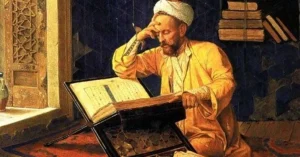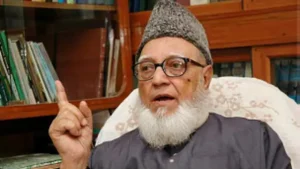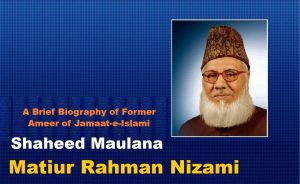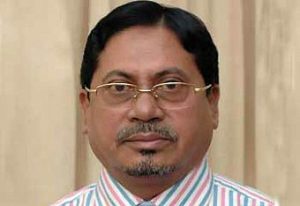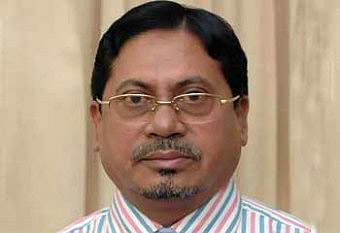
Mohammad Kamaruzzaman
The Alleged War Crimes Case
The alleged war crimes case against Shahid Muhammad Kamaruzzaman Khan represents one of the most controversial episodes in Bangladesh’s recent legal and political history. International observers, legal scholars, and human rights organizations widely viewed the charges brought against him, four decades after the Liberation War of 1971, as politically motivated and procedurally flawed.
Context and Background
During the 1971 Liberation War, Muhammad Kamaruzzaman was a student and served as the President of Islami Chhatra Sangha—the student wing of Jamaat-e-Islami. The organization, at that time, opposed the secession of East Pakistan (now Bangladesh) from Pakistan on ideological grounds. While he aligned his political position with Pakistan’s unity, no one documented any evidence during or immediately after the war that directly linked him to crimes against civilians.
However, in the aftermath of political changes in Bangladesh, and particularly after the 2008 elections, the newly elected government launched a tribunal—the International Crimes Tribunal (ICT)—to prosecute those accused of war crimes during 1971. Critics argued that political agendas drove the tribunal, that it lacked international oversight, and that it failed to meet international standards of justice.
Charges and Proceedings
Law enforcement arrested Muhammad Kamaruzzaman on 13 July 2010 and later indicted him on seven counts of crimes against humanity, including:
- Planning and participating in mass killings
- Abduction and torture
- Complicity in genocide
- Alleged involvement in the Sohagpur massacre
Throughout the trial, Kamaruzzaman maintained his innocence, asserting that political forces fabricated the charges and coerced or influenced the testimonies. His defense team repeatedly emphasized the lack of credible evidence, inconsistencies in witness statements, and absence of any contemporary records implicating him in war crimes.
Criticisms of the Trial
The trial process received significant criticism from international human rights watchdogs and legal experts:
- Human Rights Watch reported serious violations of due process, including denial of adequate time for the defense to prepare.
- The UN Working Group on Arbitrary Detention expressed concern over the fairness of the tribunal.
- Many legal observers pointed out the retrospective application of laws and the use of witness statements without cross-examination.
Despite these criticisms, the ICT sentenced Kamaruzzaman to death on 9 May 2013 for five of the seven charges. Appeals for a review were rejected by the Supreme Court, and the sentence was upheld.
A Disputed Verdict
To many, especially within the Islamic movement and international legal communities, Kamaruzzaman’s case symbolized the criminalization of ideological opposition. Unlike traditional war crimes trials that focus on evidence-based justice, political actors used his trial as a maneuver to discredit and dismantle the leadership of Jamaat-e-Islami.
Read more about Shaheed Kamaruzzaman Khan >>>
Kamaruzzaman never confessed to the allegations, and prosecutors never presented irrefutable proof against him. His supporters argue that the trial set a dangerous precedent by allowing courts to suppress dissent and eliminate political rivals.
His Final Stance
Even in the face of execution, Kamaruzzaman stood firm in his belief and refused to seek presidential mercy, declaring that it would be an admission of guilt. On the night of 11 April 2015, he was executed by hanging at Dhaka Central Jail.
He departed this world as a martyr in the eyes of his followers, who remember him not as a war criminal, but as a victim of political injustice, a symbol of courage, and a man who died with his conscience clear.
Judicial Killing in the Name of Justice
The execution of Shahid Muhammad Kamaruzzaman Khan on April 11, 2015, stands as a deeply contested moment in Bangladesh’s political and judicial history. To his supporters and numerous international observers, his death was not the outcome of a fair trial or legal process, but rather the result of a judicial killing disguised as justice.
Politicization of Justice
The so-called International Crimes Tribunal (ICT), formed in 2010 to investigate and try individuals accused of war crimes during the 1971 Liberation War, initially raised hopes of historical accountability. However, the tribunal quickly lost credibility in the eyes of many due to blatant political interference, absence of international standards, and violations of due process.
Kamaruzzaman, a high-ranking leader of Bangladesh Jamaat-e-Islami and an influential voice of Islamic politics, became one of the prime targets in this campaign. His arrest, trial, and subsequent execution were perceived as part of a broader strategy to eliminate ideological opposition under the cloak of transitional justice.
Due Process Violations and International Criticism
Throughout the legal process, Kamaruzzaman’s defense was repeatedly obstructed. His lawyers were denied adequate time and access to witnesses, while several defense witnesses were reportedly intimidated or barred from testifying. The tribunal also allowed hearsay evidence, and many prosecution witnesses gave inconsistent and uncorroborated statements.
International legal experts and human rights organizations strongly criticized the trial.
- Human Rights Watch noted that the trial lacked fairness and transparency.
- The United Nations Working Group on Arbitrary Detention expressed concern over the legal framework.
- Amnesty International stated that the trial fell “far short of international standards.”
These observations pointed to a deliberately flawed process, where conviction seemed predetermined, and the judiciary appeared complicit in a politically charged agenda.

